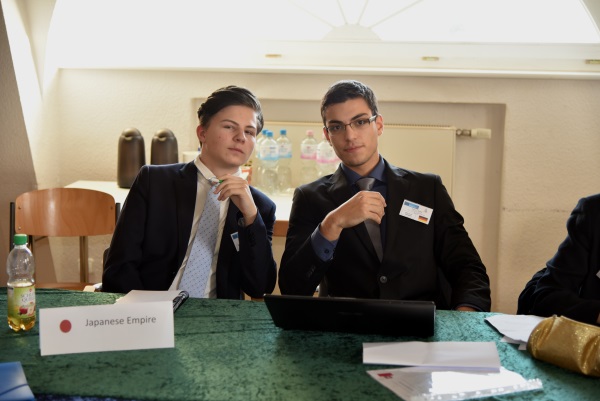 World War I was one of the greatest disasters in the history of mankind. What could be done to prevent it from ever happening again? Erasmus students from Croatia, Denmark, Germany, Poland and The Netherlands, who attended a week-long historical peace conference at Goetheschule Essen, decided on Friday, 29th January 2016, that only founding a League of Nations could lead the way into a peaceful future. Here are the results of their negotiations:
World War I was one of the greatest disasters in the history of mankind. What could be done to prevent it from ever happening again? Erasmus students from Croatia, Denmark, Germany, Poland and The Netherlands, who attended a week-long historical peace conference at Goetheschule Essen, decided on Friday, 29th January 2016, that only founding a League of Nations could lead the way into a peaceful future. Here are the results of their negotiations:

Conference Director Arie Boergen is proud of the students’ achievements.
FORUM: Paris Peace Conference ISSUE: The League of Nations SUBMITTED BY: Poland Co-Submitters: USA, Republic of China, Kingdom of Italy, Empire of Japan, Yugoslavia, The Republic of Germany, Kingdom of Belgium, Canada, Ottoman Empire, Republic of France The Paris Peace Conference, Deeply regretting the atrocities of the Great War, Noting with deep concern that such conflicts must be prevented, Alarmed by the lack of international pressure on aggressor states prior to the beginning of conflict, Bearing in mind that eventual disarmament, with a focus on the eradication of chemical weapons, should be a common ambition for all nations, Emphasizing the benefit of an international organization to promote intergovernmental cooperation and peace, Recognizing the vulnerability of an independent state without international protection, 1. Congratulates the American delegation on the Paris Peace Conference for the conception of a League of Nations; 2. Recommends the creation of the League of Nations, an organization which will promote intergovernmental cooperation and peace and provide a basis for future diplomatic discussions between all nations of the world; 3. Declares that all nations need to become members of the League of Nations; 4. Encourages diplomacy and non-aggression in the face of conflict; 5. Suggests the creation of: a. The Council, consisting of 15 non-permanent members elected every two years with at least 60% of votes, as well as 5 permanent members elected every four years with at least 75% of all votes, b. The Assembly, consisting of all member states of the League of Nations, comprised of: 1. The Disarmament Committee, 2. The Independence Committee, 3. The Economic Committee, 4. The Human Rights Committee, which is also tasked with creating a convention of human rights, c. The Secretariat, the chief administrator of the League who will be recommended by the Council and voted upon by the Assembly; 6. Further suggests the creation of: a. a peacekeeping force comprised of troops from all member states in order to respond to aggressor states as a branch of the League, b. an international court to resolve political disputes c. a healthcare commission, d. a labour commission; 7. Requests that the League of Nations promote disarmament through: a. Encouraging the limitation of arms for defense, b. Eradication of chemical weapons, c. Diplomatic discussion in order to resolve conflict; 8. Recommends that all countries have equal power in the League of Nations and that a two-thirds majority should be required to pass resolutions; 9. Further recommends that the peacekeeping force should be used in responding to aggressor states and sanctions be a consequence of aggressive action by nations a) to which every nation contributes with at least 3-5% of their military force b) in case no soldiers can be contributed, 0,05% - 0,1% of total GDP has to be contributed 10. Further suggests that the seat of the League of Nations be in a neutral nation such as Switzerland; 11. Notes that representatives to the Council should be permanently available to the League in order to respond quickly to emergency situations; 12. Recalls the suggestion of the creation of the International Development Fund in the resolution on reparations; 13. Strongly suggests that any nation which violates the terms of the League of Nations or agreements made by countries as a part of the League could receive sanctions in the form of: a. Economic sanctions, b. Military sanctions; 14. Decides to remain actively seized on the matter. 15. Urges that countries will not interfere with other nations' domestic issues unless this is requested by the country with these domestic issues.


